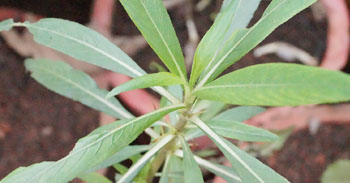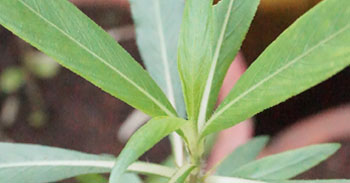KJC Medicinal Garden
kalavankabija
Hygrophila schulli
Order: Scrophulariales
Family: Acanthaceae
Genus: Hygrophila
Species: hygrophila schulli
Common Names: Ikshura, Ikshugandha
Native to Africa
Other plants of the same genus with medicinal properties
-
Asteracantha longifolia (L.) Nees
Bahel schulli Buch.- Ham
Barleria auriculata Schumach
Barleria longifolia L
Hygrophila longifolia (L.) Kurz
Hygrophila spinosa T.Anderson
Hygrophila spinosa T. Anders
- Thorny sub-shrub plant
- The plant has purple flowers and bracteoles which contain about 1 cm long
Uses in Tradition systems of medicine
- Used in Ayurveda
- Leaves, stem, flower, root, seeds are used for the treatment of Gastric disorders, Jaundice, Urinary discharge, Bacterial infection.
- Sterols
- Terpenoids
- Amino acid
- Gastroprotective activity
- anti-inflammatory
- antinociceptive activity
- Inflammation
- Joint Pain
- Cough
- Stomach ache
- Eye diseases
- Urinogenital tract diseases
- Abdominal trouble
Active Phytochemicals
phytosterols, fatty acids, minerals, polyphenols, proanthocyanins, mucilage, alkaloids, enzymes, amino acids, betulin, β- carotene, hentriacontane, apigenin-7-O-glucuronide, apigenin-7-Oglucoside, 3- methylnonacosane, 23-ethylcholesta-11, 23-dien-3β-ol, luteolin, asteracanthine, asteracanthicine, luteolin-7-rutinoside, methyl-8-n-hexyltetracosanoate, β-sitosterol, histidine, phenylalanine, lysine, ascorbic acid, nicotinic acid, n-triacontane, glucose, mannose, rhamnose, arabinose, xylose, maltose, myristic acid, oleic acid, palmitic acid, stearic acid, Phytoconstituents such as lupeol, lupenone, 25-oxo-hentriacontanyl acetate, stigmasterol,
References
1. Kannur D, Paranjpe M, Dongre P, Kumbhar S, Khandelwal K. Anti-inflammatory and antinociceptive activities of H. schulli seed extracts. Int J Green Pharm 2012;
2. Hussain, M. S, Nazeer Ahamed, K. F. H. And Ansari M. Z. H. (2009).Preliminary Studies on diuretic effect of hygrophila auriculata (schum) heine in rats. International Journal of Health Research, 2(1).

